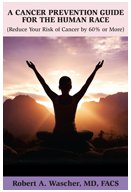 |
A Cancer Prevention Guide for the Human Race
|
Introduction Few, if any, diseases evoke a greater sense of dread than cancer. Patients newly diagnosed with cancer often react with a combination of fear and disbelief, and with a powerful and sudden realization that nothing is promised to any of us beyond the current moment.
Few, if any, diseases evoke a greater sense of dread than cancer. Patients newly diagnosed with cancer often react with a combination of fear and disbelief, and with a powerful and sudden realization that nothing is promised to any of us beyond the current moment.
Over the past 30 years, significant progress has been made in treating cancer. Based upon recent cancer survival statistics, an unprecedented 65 percent of all patients newly diagnosed with cancer are likely to be alive and clinically cancer- free 5 years later (for most types of cancer, being free of residual or recurrent cancer for 5 years is considered to be the clinical equivalent of a cure). However, the emotional, physical, and financial costs of cancer remain very high even for long-term cancer survivors, and for their loved ones. While an increasing number of cancer patients are becoming long-term survivors, cancer continues to take a heavy toll on the lives of both the young and the old throughout the world.
Despite continuing advances in cancer treatment, cancer is still a very frequent cause of death. For the nearly 600,000 patients in the United States, alone, who died of cancer in 2009, and for whom cure was therefore not possible, only cancer prevention could have potentially prevented some of these premature deaths. While not every case of cancer can be prevented (or cured), recent clinical research findings suggest that, conservatively, 40 to 65 percent of all cases of cancer, including some of the deadliest forms of cancer, can be prevented with prudent and relatively moderate lifestyle and diet changes. Therefore, when it comes to the issue of cancer prevention, the old adage about an ounce of prevention being worth a pound of cure should probably be revised to, An ounce of cancer prevention is worth a ton of cancer cure.
Before I begin my comprehensive discussion of evidence-based cancer prevention lifestyle and diet strategies, I must first offer a few words of caution. We live in a truly wondrous age where information about almost any subject can be effortlessly and instantaneously acquired from a variety of sources. Unfortunately, the sheer volume and complexity of the health-related information at hand can challenge even the most knowledgeable among us when trying to separate valid information from useless (and sometimes dangerous) anecdotes, over-simplifications, and transient fads. The unfortunate reality is that much, if not most, of the health-related information that is presented in the popular media, including the Internet, is based primarily upon anecdotal evidence, badly performed science, junk science, no science at all, or cherrypicked science.
One must always remember that the Worldwide Web, which has revolutionized the global dissemination of information, remains a completely unfiltered source of health information. Therefore, consumers of health information have to be especially cautious when evaluating the plethora of claims and recommendations available on the Internet, and from other public sources of information. (As one should, indeed, not judge a book by its cover, so it is that one should also not judge the accuracy of the content of a website by how professional the site appears to be.)
One should also not judge the validity of health-related theories and claims made by self-anointed experts based solely upon the number of degrees that appear behind their names. Similarly, the use of celebrity spokespersons to advocate for (or against) particular diets or treatments is a common practice, and one that is rife with oversimplification, misrepresentation, and outright fraud. To put it rather bluntly, there is an enormous volume of bad healthrelated information to be found wherever one looks, including on the Internet, on television, and in many popular magazines and books.
As just one example, take the bestselling book by an author who describes herself as an independent research scientist (actually, it appears that she obtained a Ph.D. degree in Zoology in 1958, and has had no subsequent clinical research affiliations with any major university or medical center during the past 30 years). In her book, which currently enjoys the lofty Amazon.com sales rank of #9,183, she makes the jaw-dropping claim that modern science has somehow failed to discover, as she has, that all cancers are actually caused by a single human parasite, and that, therefore, all cancers can be cured by eradicating this parasite with her proprietary diet plan and herbal supplements!
Reprinted by permission
A Cancer Prevention Guide for the Human Race
offers health-conscious readers a vital research-based guide that will enable them to significantly reduce their risk of developing cancer.
by Robert A. Wascher, MD, FACS.